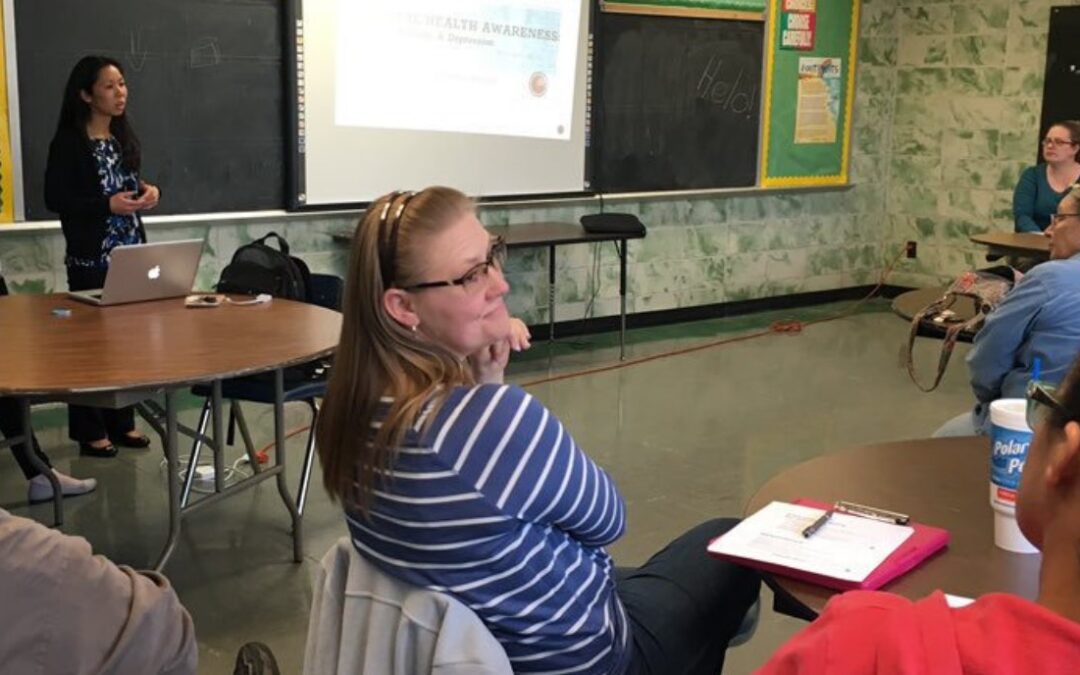For our second blog post of the week (surprise!) – JMF brings you another interview from one of our HOPE Program speakers, Dr. Katherine Soe. Dr. Soe is currently completing her residency training in pediatrics, adult psychiatry, and child and adolescent psychiatry at Indiana University. She is another highly valuable asset to HOPE, and JMF feels lucky to have her not only speak for our mental health program, but also advocate for the foundation as a whole. Keep reading to learn more about Dr. Soe, and her advice for how to begin the conversation of mental health with your child.
Could you speak a bit about your background? How did you get into your current field, and why is it such a passion for you?
I grew up in California, went to Creighton University for medical school, and moved to Indianapolis for residency training in pediatrics/psychiatry/child and adolescent psychiatry at Indiana University/Riley Hospital for Children. I have always loved working with children, and feel that early exposures, experiences, and interventions can impact the rest of their lives. I am also intrigued by the field of medicine. Yet, the mind and body are so intimately intertwined, that I could not imagine training in either pediatric medicine or psychiatry without the other. Medical conditions can manifest with neuropsychiatric symptoms, and often coexist with psychiatric illness. I am now integrating these specialties in my training and career, with the goal of addressing both mental and physical well-being – the whole child- in individual and community health. It is an extremely rewarding path, fueled by the relationships one builds with families and the healthcare team, and a child’s smile.
You have spoken for the Joseph Maley Foundation’s HOPE Program. How was this experience?
Speaking with JMF’s HOPE Program has been a wonderful experience, and I am incredibly thankful for this opportunity to get to know our community better, and to address children’s health with both students and parents. HOPE is such a valuable opportunity for our students, helping to develop skills that can have a lifelong impact on both their physical and mental health. It is a privilege to be a part of this initiative, to help promote these skills, and dispel negative stigma and myths that can impede success. The students’ energy, enthusiasm, and eagerness to participate and excel when I come speak with HOPE inspire and motivate me, and I always look forward to the next opportunity!
How were you first introduced to the HOPE program?
One of my colleagues used to speak for JMF’s HOPE program and spoke highly of it, and so I was excited to take on the role!
Why do you think mental health education is so important for young children?
Children are disproportionately influenced by what they learn from those around them, whether it be increased awareness, knowledge, social perceptions, stigma or opinions. Additionally, early education and learned behaviors can impact a child the rest of their life. Mental illness can affect people at any age; in fact the American Psychiatric Association reported that one in four children will be impacted by mental illness, with half of mental illnesses manifesting by age 14. The news all too frequently emphasizes how mental health impacts our schoolchildren. Importantly, early diagnosis and treatment of these conditions can significantly improve outcomes. Thus, it is critical that we begin to educate young children about the importance of taking care of their mental health, teach coping skills to build resiliency, and open the door of communication by which to ask for help if needed, whether for themselves or a peer.
What recommendations do you have for families to help initiate conversations about mental health with their children?
Talk with your child and listen to them, without judgement. Talk about your feelings and emotions so they learn by example to use this language. Pay attention to their feelings. Regularly check in with them. Practice coping skills at home. Serve as their role model- encourage them to seek help if needed, and demonstrate asking for help when you need it as well. Be open and honest. We also discuss this topic at greater length when speaking with parents through the HOPE program.
As you know, the statistics regarding mental health in Indiana are pretty dire. What do you think we can do to help turn this around?
We can do plenty, starting with our own individual interactions, and continuing to the national level. Mental health is unfortunately shrouded in stigma, and it is our responsibility to change the conversation. We can start by non-judgmentally addressing mental health in our everyday interactions with our children and colleagues. Ask how people are doing, and listen. Don’t be afraid to talk about your own emotions and reach out for help yourself when you need it—children tend to follow their examples. Come to the parent nights with JMF’s HOPE program. If interested, you can also get involved locally, or learn about and advocate for mental health issues by reaching out to your state representatives in the legislature. This is a critical time for our children, and your voice matters!
